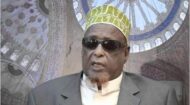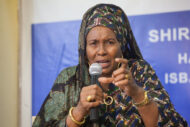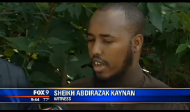PORTRAIT OF THE CANADIAN AS WARYA
By Mohamud Siad Togane
Somalis yell out, Warya! Meaning, hey you, if they see a stranger whom they believe to be one of their own sort. Then they wait and hope for a recognitive response for that is not only how they sniff each other out but also how they get each other’s attention. Warya is so distinctly Somali as “eh” is so distinctly Canadian that folks refer to Somalis as warya just like tabarnak is so distinctly Quebecois that in Mexico the Canucks are now known as Los Tabarnacos.
Out of the blue, in a restaurant on Yonge street, in 1973, in a lucky stroke of serendipity, I chanced upon Abdullahi Isse Ali, now known here to his friends as Isaac who greeted me with, “Donkey’s years ago when my father came wandering to Mogadishu from Macavity Mystery Cat Majertenya region, from the boondocks of Bari, your father, Siad Togane, welcomed him; now here you are welcoming me to Toronto. May our generational affinity last forever!”
I did not have to yell out, warya, for I had known Isaac since 1959 when we were both students at the Mennonite Mission Boarding School for boys, at the bend of the hippo-happy, croc-rippling, sun-spangled Shabelle river, in the Somali village of Mahaddei Wayn. When I happened upon Isaac in that Yonge street restaurant, in 1973, there were less than half a dozen Somalis in all of Canada; now we are as ubiquitous as the maple leaf itself.
Isaac fled from Somalia, because in the words of Margaret Atwood, he decided, “This above all,
to refuse to be a victim.” It was and still is over there, Sauve qui peut: let everyone who can, save themselves. He had two choices over there in Mogadishu: either to be a victim or a victimizer. He could not simply be a citizen. There was no real Somali nation-state of which to be a citizen even though then in 1973 there was ostensibly a Somali nation-state which was primarily as bogus as Potemken.
What you had and what you still have over there is the Devil’s collection of crackpot clans, the Devil’s concoction of crazy clans. Because of the Somali Klan, which believes and practices clanism, the most insidious sort of racism, the worst fears our First Lady of Canadian letters, Margaret Laurence, had about the Somali future came to fruition, came calling to collect their harvest of horrors and tears of terror and showers of shame and then some. In her book, The Prophet’s Camel Bell, she wrote presciently and prophetically, “But I wondered about the future. When this country had self-government, what then? How long would it take them to overcome inter-tribal bickering, or could it ever be overcome . . . ? Or perhaps their leaders would wrangle interminably, unable to discover a way of overcoming . . . .” As she was leaving Somalia, her parting shot, her last words which ought to shame and haunt all Somalis were: “The best we can wish them, and the most difficult, is expressed in their own words of farewell. Nabad Gelyo—-May you enter peace.” Let alone enter peace, Somalia has yet to exit out of the labyrinthian, clannish, eternal cul-de-sac civil war it had soon entered.
Today life inside Somalia is Hobbesian: “Solitary, poor, nasty, brutish, and short”. The Four Horsemen of the Apocalypse: war, pestilence, famine and death go on their daily rounds, donning daily their devilish, dirty disguises, prowling like lions seeking whom they may seize to devour. That is why Isaac and thousands of Somalis had fled to Canada and found Canada to be a land kinder than suicidal, sadistic Somalia where they were born and which once they had called home; that is why countless Somalis keep on perishing at sea in unseaworthy boats in their desperate, often futile, attempts to flee from Klan-obsessed, Klan-infested, sicko Somalia. Willy-nilly, each and every Somali is incarcerated in the crooked, clammy clutches of their cuckoo clan.
The American journalist, Scott Peterson, in his book, Me Against My Brother, blows the lid off this clannish captivity, this cruel conundrum, this criminal calamity, this apocalyptic cataclysm, cradled by this creed which Somalis live by and die by daily. He came upon this awful ophidian coiled in “The hierarchy of priorities, as orderedby [this] Somali proverb”:
Me and my clan against the world;
Me and my family against my clan;
Me and my brother against my family;
Me against my brother.
No wonder Isaac is never tempted to look back since he had quit that sorry-ass Somali scene. “I do not want to be turned into a pillar of salt like Lot’s wife,” he deadpans. He considers himself so lucky, so blessed that he and his wife, Zainab Jama, are now Canadians: free, no longer held captive by that anachronistic, cannibalistic claims of that clannish, kooky creed; free to bring up their children in Canada whose humanity, ideals, values and vision are best fleshed out, are best voiced by one of her most eminent citizens, the late F.R. Scott—lawyer, social philosopher and poet whose personal Canadian creed is still as perennial as ever:
The world is my country
The human race is my race
The spirit of man is my God
The future of man is my heaven.
In November 1973, in his first night in Toronto, Isaac had no place to lay his head, so he slept on the lawn of the former City Hall of Toronto. Today he and his wife, Zeinab, are proud owners of their own home in Oakville and a summer cottage to boot in Muskoka, Lake of Bays. The first job Isaac had held was at Howard Johnson as a busboy; today he is the Vice President of Strategic Consulting at Quasep Ontario which is one of the largest consulting and purchasing group company with offices in Toronto, Ottawa, and Montreal.
As soon as Isaac is through with his regular day job, he moonlights running his own apparel company on Weston & Lawrence that he himself had founded, called—what else– Warya. He designs the clothes himself; their signature themes are nomadic, pastoral, literary.
Who wears Warya?
The with-it happily hip, The cool, the connected, the cognoscenti crowd everywhere wear Warya.
That’s who.
It is no wonder that Isaac is so successful in Canada: he hails from a patrician pedigree of barons, merchant princes, entrepreneurs and real estate developers called, the Ali Saleman. The buildings that were once the historical landmarks of the city of Mogadishu, that once dominated the skyline of the city belonged to his agnates, the Oonlaye brothers.
Ali Mathobe, another of his agnates, owned and operated one of the city’s best restaurants which was the place to see and be seen, the hangout for the literati, the glitterati, the American peace corps and other expats. Ali famously wrote to NASA asking them to sell him a lot on the moon, on which to build a Somali restaurant, when he had heard on the BBC, in 1969, that the Americans had landed on the moon. Of course all that the Ali Saleman and other Somalis had built had been destroyed by the Hutu Hawiye hayseeds, the Bantu barbarian bandits and looters, who, in an orgy of a fit of frenzied fury of destruction from which they have yet to emerge satiated, pillaged, sacked, and razed the historical, cosmopolitan, world-class city to the ground.
The secret of Isaac’s success is that he has “found salvation in surrender”: He does not fight the fate that had flung him here. He accepts it; indeed he ardently embraces his Canadian kismet. He is no Jimmy Tomorrow who believes, who buys the by now putrid pie in the sky that tomorrow Righteousness and Peace will break out and will kiss each other in Mogadishu so he can hie home.
“I’m at home right here, right now in Canada, in Toronto. Now Canada is my home; now Canada is
my country,” he counterpunches, “for home, like Hemingway’s Paris, is a moveable feast. Daily I make my Joycean choice of holding tight ‘to the now, the here, through which all future plunges into the past.'” Unlike some ne’er-do-wells Isaac has no time to waste and sit upon his ass for hours on end measuring out his life with coffee spoons in coffee shops singing out of tune the by now longueur-laden, tiresome, trite, tedious, look-how-they-done-me wrong, poor me Mogadishu bluesy Blues. “I prefer listening to the St. Louis Blues and Leadbelly-Bourgeois Blues and Bessie Smith and Boogie-woogie and ragtime as I work,” Isaac counters.
Margaret Atwood, our own literary world heavy weight champ, in her Canadian classic, Survival, contends that survival is the all-Canadian literary theme and symbol. Not only have Isaac and his family survived here, they have also been thriving here. Zainab Jama, Isaac’s better-half, graduated from Reyerson, and now works as a social worker for the Ontario Children’s Aid Society. Yusuf, their oldest son, is studying International Relations at York University; Mohammed is studying Urban Planning at Reyerson, his mother’s Alma Mater; their daughter, Lul or Jewel, the baby of the family, is 9 years old. Isaac and his family are the quintessence of the Canadian family, ideal Canadian citizens, warya or otherwise.
They are literally living out F.R. Scott’s noble Canadian vision for which they are working with passion born of the positive attitude of counting one’s blessings, the positive attitude of gratitude for all they have achieved and will yet achieve in their country, Canada. Viktor Frankl had concluded, after the Nazi robbed him of everything including his patria, after surviving the Nazi attempt to make the world Judenfrei, free of Jews, that “everything can be taken from a [human being] but one thing: the last of the human freedoms—to choose one’s attitude in any given set of circumstances, to choose one’s own way. ” Isaac’s choice of his own way out of the Shakespearean Somali senseless tragedy, his own choice of hope and light over desolate despair and deep darkness, his own choice of Canada and can-do attitude inspires and lifts up the spirit of everyone who knows of his Canadian survival story and of his brave passage to Canada.
In 1897, Kipling called Canada, “Our Lady of the Snows”. Then there is also that old Samuel Butler’s “gibe–-Oh God, Oh, Montreal!” Wyndham Lewis, another lousy Limey, rubs it in with the icy image and more: Canada is “the most parochial nationette on earth … I have been living in this sanctimonious icebox … painting portraits of the opulent Methodists of Toronto. Methodism and money in this city have produced a sort of hell of dullness.
” Oh my, oh my, how things have changed: now there is not even a meow out of the Methodists of yesteryear while the Moslems are now constantly clamouring for our attention calling us all to prayer, calling us all to their Moslem millennium, from their Little Mosque on the Prairie and from everywhere. “You can’t throw a stone without breaking a church window,” Mark Twain cracked in his 1881 visit to Montreal; now you can’t throw a stone without breaking a mosque window in Montreal, in Toronto too, in every Canadian major city and beyond all the way into the boondocks. Isaac also proves in his Canadian peaceful, law-abiding daily life that a Moslem is not what the enemies of Islam allege a Moslem to be: “a tyrant at home, a terrorist abroad, and a bigot in both.”
The Montreal Canadian-Lithuanian poet, Raymond Filip, who now teaches at John Abbott College, concludes his poem, The Mighty Buck, the Immigrant Fuck, and Melting Pot Luck, with this line: “I am nothing left to be but Canadian.” But with that nothing you have everything to gain, as Isaac has been proving it, as long as you gladly accept and embrace your Canadian lot just as Isaac has done. Then, you can access success just as Isaac has been doing for you hold in your own hands the keys to enter into this peaceable kingdom where your “attitude determines your altitude”; where you can become anything you want to be just as Isaac has been proving it; provided you just don’t quit and croak in self-defeating attitude, “the struggle naught availeth, / The labour and the wounds are vain,”; provided you just don’t stay in bed playing dead all day long. Isaac and his family and countless other Canadians prove every day that I am not here just handing you hogwash, just blowing smoke, just parroting bromide, just peddling pop pap, just plying you with canting unctuosity smoked and cured and mollycoddled in the not-so curious cocoons of clichés larded with empty eyewash and inane nostrums of storming snow job. Even the exceptions to this happy and exemplary Isaac saga prove my point which is, how, most often, all that can be achieved, at the price of an honest effort, is often truly heroic, is often truly preternatural. It is most motivating, most heartwarming to witness what Isaac has been accomplishing here throughout his 36 Canadian years of labour and love, armed with nothing but his modus operandi: a beatific black Buddha smile brimming always with Carlyle’s “. . .
EVERLASTING YEA, wherein all contradiction is solved: wherein whoso walks and works, it is well with him;” brimming always with an attitude of “Yes” which is according to Louis Untermeyer “no less / Than God’s excess.”
Andrew H. Malcolm, in his book, The Canadians, describes a Toronto school beauty pageant puppet show put on by fourth-graders—many from immigrant homes—in which the puppet finalist says, “My name is Roberta Mackenzie, and I am from Canada . . . . But I don’t know what that is.” Which, of course, brings down the house. Which, of course, beats that cold old Jacques Cartier chestnut: “In fine I am rather inclined to believe that this is the land God gave to Cain.”
But I am most inclined to believe that Cartier had Somalia in mind when he wrote that which now boasts that it is absolutely Judenfrei and Christianfrei; Somalia where Cain is even now shedding Abel’s blood; Somalia where brother is even now butchering brother; soi-disant Moslem Somalia where Mohamed and Hassan are even now hacking Mahmud and Hussein to death—-that truly is indeed Somalia, the land God gave to Cain and not Canada where peace and prosperity are the order of the day. I have heard many warya Canadians struggling with what to call Canada. Here is a sample:
“Canada, the land of milk, maple syrup and Molson for Moslems!”
“Canada is the sigh of relief I suspire whenever I come home to Canada from ‘wandering on a foreign strand’.”
“Canada is the land kinder than home where one can enter blissful peace.”
“Canada is the heaven Somalis get to go to after they have survived the hell on earth called Somalia.”
Isaac plugs, “Canada is where you can wear Warya warm, cozy, aglow with Peace, Blake’s human dress.”
And finally the zinger, the clincher heard on the BBC Somali Service Program by a Somali woman refugee in Canada who quipped, “Canada is a country in which for six months the trees go naked and for the other six the natives go gaga, go ape, go buck-naked!”
by Mohamud Siad Togane
E-Mail:[email protected]

 All Posts
All Posts









